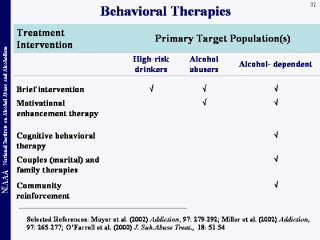Search for most updated materials ↑
| front |1 |2 |3 |4 |5 |6 |7 |8 |9 |10 |11 |12 |13 |14 |15 |16 |17 |18 |19 |20 |21 |22 |23 |24 |25 |26 | 27|28 |29 |30 |31 |32 |33 |34 |35 |36 |37 |38 |39 |40 |41 |42 |review |
 |
Historically, research on
professional psychosocial interventions focused first on development
of theoretical frameworks to explain change and to direct
intervention efforts. Examples of such frameworks include
cognitive-behavioral, twelve-step, and motivational enhancement.
Subsequent research in this area included studies to refine the
internal validity of studies of these frameworks using therapy
manuals, training, and monitoring; development and use of
well-validated and reliable instruments; and improved research
designs such as randomized controlled trials. The results were
unexpected: treatments with very different conceptual frameworks and
intervention techniques have approximately equivalent (and
reasonably good) outcomes (e.g., abstinence or significantly
decreased drinking and consequences). Furthermore, relatively brief,
non-intensive treatments yield outcomes as good as more intensive
treatments. These results suggest that non-specific factors such as
a decision to seek help, installation of hope, empathy and the
therapeutic alliance may be more important than specific factors
hypothesized by treatment models.
|